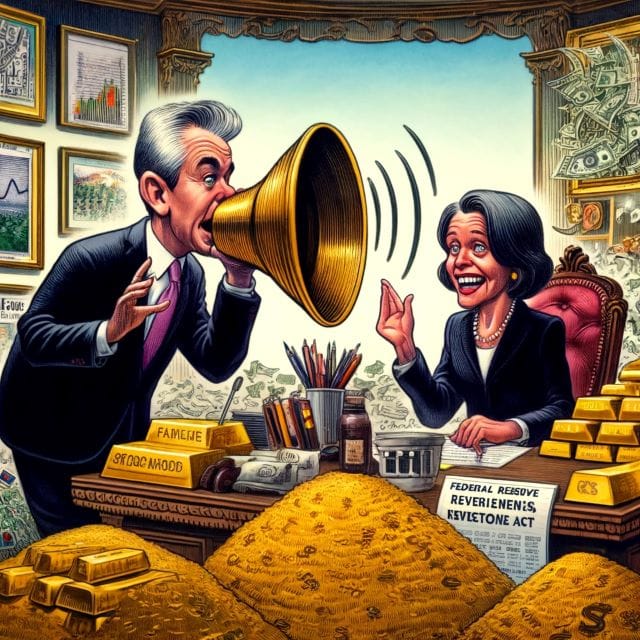Federal Reserve and FinCEN Jealously Eye Antisemitism Act

In an audacious move that could make even Kafka blush, Federal Reserve Chairman Jerome Powell, in cahoots with FinCEN's Andrea Gacki, who’s referred to as the 'Chief Financial Inquisitor' behind her back, have been caught on a hot mic plotting to protect the Federal Reserve’s delicate sensibilities from the barbarous hordes of critics and econ majors.
“We’ve been thinking,” Powell whispered, not knowing his microphone was more sensitive than a mid-level bureaucrat after a performance review, “if it’s good enough for the Antisemitism Act, it’s good enough for us. Why shouldn’t criticism of the Fed be a financial crime? After all, every time someone questions our decisions, a dollar loses its wings.”
Gacki, seen nodding vigorously in the recording, responded with a fervor that could only be fueled by the intoxicating power of bureaucratic overreach. “Absolutely, Jerry. It’s high time we recognize that financial stability depends on absolute, unwavering faith in Federal Reserve policies. Second to privacy, doubt is the real enemy of economic prosperity.”
The proposed bill, a draft copy of which was leaked by a staffer to the Bugle, tentatively titled the Federal Reserve Reverence Act, would see that any derogatory comments about the Fed could result in penalties ranging from being forced to read every speech ever given by a Fed Chair, to harsher punishments like having every financial transaction monitored and questioned by the Fed in perpetuity, and of course prison.
When questioned about the apparent violation of the First Amendment, the staffer just laughed, adding that "the First Amendment is as dead as Elizabeth Warren's commitment to the American worker."
Critics of the Federal Reserve, a motley crew of free-market enthusiasts, disgruntled econ students, Bitcoiners, and anyone who’s ever glanced at their savings account, have long been a thorn in the side of the institution. However, with this new act, Powell and Gacki aim to upgrade that thorn to a legislative lance.
“This is about respect,” Powell explained to a potted plant later, still unaware of the mic situation. “Respect for the complexities of macroeconomic management, and respect for the people who have the herculean task of adjusting interest rates and trying to explain why.”
The proposed Federal Reserve Reverence Act could also have dramatic repercussions for ongoing legal battles, such as the Custodia lawsuit. Caitlin Long, a crusader in the realm of Bitcoin and banking, has famously sued the Federal Reserve, claiming dereliction of duty in their sluggish pace of approving her company’s master account application. Under the new law, such outspoken criticism from Ms. Long could be classified not merely as disgruntlement, but as a criminal act of financial heresy.
Legal analysts are scratching their heads, wondering if this could set a precedent where regulatory criticism, a staple of financial discourse, becomes a dance with legal jeopardy. “If this law passes, we might need to invent a new kind of law firm,” joked one lawyer, “one specializing in financial opinion defense.” As the courtroom battles heat up, one can only imagine the legal gymnastics that will be required to navigate a landscape where criticizing the referee could get you ejected from the game.
The academic community is similarly up in arms, claiming this is a direct attack on freedom of speech and a sad day for anyone who dares to question governmental authority. “What’s next?” asked Michael Munger, outspoken professor of economics at Duke and notorious critic of Keynesian economics, “Making it illegal to criticize the law that makes it illegal to criticize the Fed?”
Meanwhile, social media has been ablaze with hashtags like #FedUp and #DontTreadOnMyFed, each side attracting followers like a Fed Chair attracts suspicion. “If they pass this, what will I complain about? Now that the faketoshi saga is over. I guess there's always inscriptooors.” tweeted one disillusioned Bitcoiner, sparking a thread that ended up discussing the existential void that would be left by such a prohibition.
In response to these criticisms, Gacki was overheard reassuring Powell, “Don’t worry, the masses will adjust. After all, if history has taught us anything, it’s that people love being told what they can and cannot criticize. They all just love to comply harder.”
As this story develops, one thing remains clear: In the hearts of federal financial regulators, the line between satire and legislative proposal is as thin as the paper our increasingly symbolic dollars are no longer printed on.






